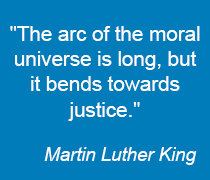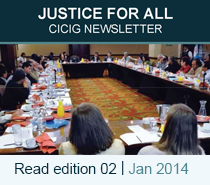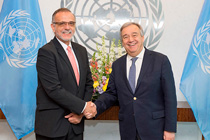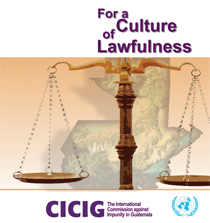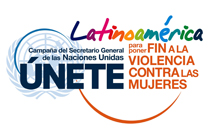PRESS RELEASE 030
CICIG REQUESTS PUBLIC EXPLANATION FROM SENATOR LANDRIEU (LOUISIANA, UNITED STATES) REGARDING ILLEGAL ADOPTIONS IN GUATEMALA REPORT
During her visit to Guatemala, the Senator met with various authorities responsible for protecting children and expressed her disagreement with the CICIG report on criminal structures involved in illegal adoptions.
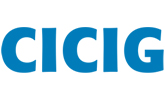 Guatemala, April 27, 2011. In the edition of April 26, 2011 of Guatemalan daily newspaper Prensa Libre, an article published on pages 4 and 5 in relation to the visit of US Senator Mary Landrieu stated: "Landrieu indicated that she did not agree with all the findings that CICIG presented in a report at the end of 2010, which provided details of irregularities in the adoption processes that were left "in transition" between the former and current laws."
Guatemala, April 27, 2011. In the edition of April 26, 2011 of Guatemalan daily newspaper Prensa Libre, an article published on pages 4 and 5 in relation to the visit of US Senator Mary Landrieu stated: "Landrieu indicated that she did not agree with all the findings that CICIG presented in a report at the end of 2010, which provided details of irregularities in the adoption processes that were left "in transition" between the former and current laws."
The International Commission against Impunity in Guatemala publicly requests that Senator Landrieu provides evidence to Guatemalan society to substantiate her dismissal of the content of the Report on Players Involved in the Illegal Adoption Process in Guatemala. Furthermore, the Commission invites the Senator to clarify her stance regarding the numerous adoptions of children illegally taken from their biological parents.
CICIG would like to make it publically known that the report is the product of work undertaken by a team of professional experts. The work was conducted over the course of 18 months, including the analysis of 3342 notarial writs of Attorney General of the Nation's Office (PGN) records on adoption processes, 1412 certificates of verification issued by the PGN and the National Council for Adoption (CNA), 879 requests and custody measures of juvenile courts, and 153 adoptability decrees issued by juvenile courts. Furthermore, 50 investigations were examined that had been conducted by the Public Prosecutor's Office (MP) in relation to the crime of human trafficking for adoption purposes.
The analysis of information established that 60 % of the analyzed adoption procedures were affected by irregularities such as theft, buying and selling of children, threatening and deceiving biological mothers, and forging documents for adoption procedures both before and after the entering into force of the Adoptions Act (December 31, 2007). There are multiple, strong pieces of evidence that, in a number of cases, the irregularities were implemented by transnational organized crime structures that operated in conjunction with or under the acquiescence of State officials. At present, the Public Prosecutor's Office (MP) is investigating more that 325 adoption procedures with signs of serious irregularities.
In its report, CICIG established the modus operandi of transnational criminal networks involved in children trafficking for adoption purposes. CICIG also demonstrated that in Guatemala, international adoptions are commonly a mechanism whereby children are handed over to whoever so requests and pays, rather than being a means of finding a vulnerable minor a family. Therefore, adoptions have become a lucrative act of human trafficking—a criminal offence under the Guatemalan Criminal Code.
The report also indicates that only 10 % of children who were adopted between 2007 and 2010 were orphans or abandoned children.
There are also certain cases in which, despite having knowledge of the illegal origin of the adopted children, the representatives and/or facilitators of the international adoption agencies in Guatemala went ahead with the illegal procedures, using modified DNA tests, threatening and deceiving biological mothers and using false documentation.
CICIG supports international adoptions as a life option for the children who need it. However, as the pending adoption procedures are plagued by serious irregularities, CICIG backs the stance assumed by the PGN, CNA and MP (competent institutions in the field) and, in particular, believes each individually-approved adoption procedure should at least establish: 1) The legal origin of the minor, 2) the ratification of consent by the biological mother, 3) the identification of parentage through DNA tests, and 4) the veracity of the identification documents of the child and the mother.
CICIG reiterates its strong commitment to continuing to support Guatemalan institutions, in particular the Attorney General of the Nation's Office (PGN), the National Council for Adoption and the Public Prosecutor's Office (MP), in their fight to eradicate illegal adoptions and tackle impunity.


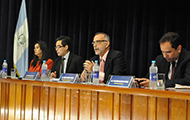
 Guatemala, April 27, 2011. In the edition of April 26, 2011 of Guatemalan daily newspaper Prensa Libre, an article published on pages 4 and 5 in relation to the visit of US Senator Mary Landrieu stated: "Landrieu indicated that she did not agree with all the findings that CICIG presented in a report at the end of 2010, which provided details of irregularities in the adoption processes that were left "in transition" between the former and current laws."
Guatemala, April 27, 2011. In the edition of April 26, 2011 of Guatemalan daily newspaper Prensa Libre, an article published on pages 4 and 5 in relation to the visit of US Senator Mary Landrieu stated: "Landrieu indicated that she did not agree with all the findings that CICIG presented in a report at the end of 2010, which provided details of irregularities in the adoption processes that were left "in transition" between the former and current laws." 